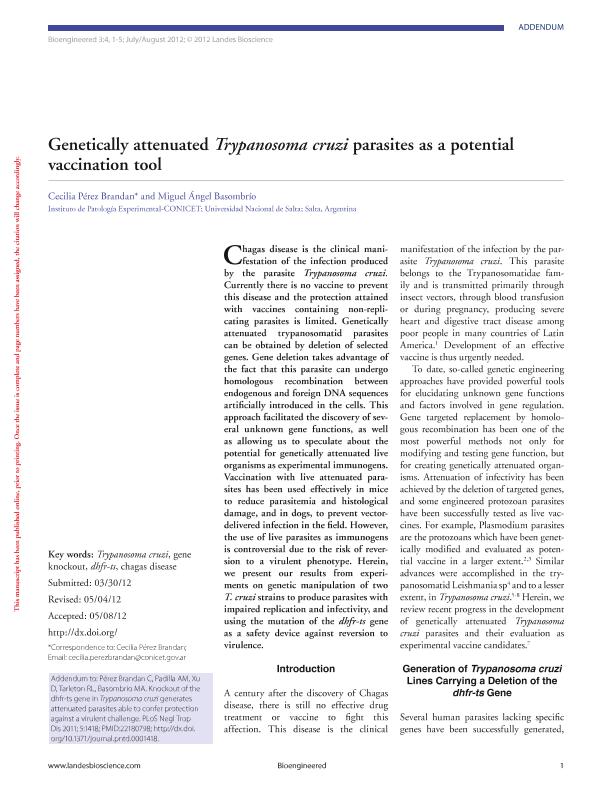Mostrar el registro sencillo del ítem
dc.contributor.author
Pérez Brandan, Cecilia María

dc.contributor.author
Basombrio, Miguel Ángel Manuel

dc.date.available
2017-09-14T21:52:03Z
dc.date.issued
2012-06-18
dc.identifier.citation
Pérez Brandan, Cecilia María; Basombrio, Miguel Ángel Manuel; Genetically attenuated Trypanosoma cruzi parasites as a potential vaccination tool; Taylor & Francis; Bioengineered; 3; 4; 18-6-2012; 1-5
dc.identifier.issn
1949-1018
dc.identifier.uri
http://hdl.handle.net/11336/24329
dc.description.abstract
Chagas disease is the clinical manifestation of the infection produced by the parasite Trypanosoma cruzi. Currently there is no vaccine to prevent this disease and the protection attained with vaccines containing non-replicating parasites is limited. Genetically attenuated trypanosomatid parasites can be obtained by deletion of selected genes. Gene deletion takes advantage of the fact that this parasite can undergo homologous recombination between endogenous and foreign DNA sequences artificially introduced in the cells. This approach facilitated the discovery of several unknown gene functions, as well as allowing us to speculate about the potential for genetically attenuated live organisms as experimental immunogens. Vaccination with live attenuated parasites has been used effectively in mice to reduce parasitemia and histological damage, and in dogs, to prevent vector-delivered infection in the field. However, the use of live parasites as immunogens is controversial due to the risk of reversion to a virulent phenotype. Herein, we present our results from experiments on genetic manipulation of two T. cruzi strains to produce parasites with impaired replication and infectivity, and using the mutation of the dhfr-ts gene as a safety device against reversion to virulence.
dc.format
application/pdf
dc.language.iso
eng
dc.publisher
Taylor & Francis

dc.rights
info:eu-repo/semantics/openAccess
dc.rights.uri
https://creativecommons.org/licenses/by-nc-sa/2.5/ar/
dc.subject
Trypanosoma Cruzi
dc.subject
Gene Knockout
dc.subject
Vaccine
dc.subject
Chagas Disease
dc.subject
Dhfr-Ts
dc.subject.classification
Ética Médica

dc.subject.classification
Ciencias de la Salud

dc.subject.classification
CIENCIAS MÉDICAS Y DE LA SALUD

dc.title
Genetically attenuated Trypanosoma cruzi parasites as a potential vaccination tool
dc.type
info:eu-repo/semantics/article
dc.type
info:ar-repo/semantics/artículo
dc.type
info:eu-repo/semantics/publishedVersion
dc.date.updated
2017-05-29T15:37:58Z
dc.journal.volume
3
dc.journal.number
4
dc.journal.pagination
1-5
dc.journal.pais
Reino Unido

dc.journal.ciudad
Londres
dc.description.fil
Fil: Pérez Brandan, Cecilia María. Consejo Nacional de Investigaciones Científicas y Técnicas. Centro Científico Tecnológico Conicet - Salta. Instituto de Patología Experimental. Universidad Nacional de Salta. Facultad de Ciencias de la Salud. Instituto de Patología Experimental; Argentina
dc.description.fil
Fil: Basombrio, Miguel Ángel Manuel. Consejo Nacional de Investigaciones Científicas y Técnicas. Centro Científico Tecnológico Conicet - Salta. Instituto de Patología Experimental. Universidad Nacional de Salta. Facultad de Ciencias de la Salud. Instituto de Patología Experimental; Argentina
dc.journal.title
Bioengineered
dc.relation.isreferencedin
info:eu-repo/semantics/reference/url/http://www.tandfonline.com/doi/abs/10.4161/bioe.20680
dc.relation.alternativeid
info:eu-repo/semantics/altIdentifier/url/http://www.tandfonline.com/doi/full/10.4161/bioe.20680
dc.relation.alternativeid
info:eu-repo/semantics/altIdentifier/doi/http://dx.doi.org/10.4161/bioe.20680
Archivos asociados
